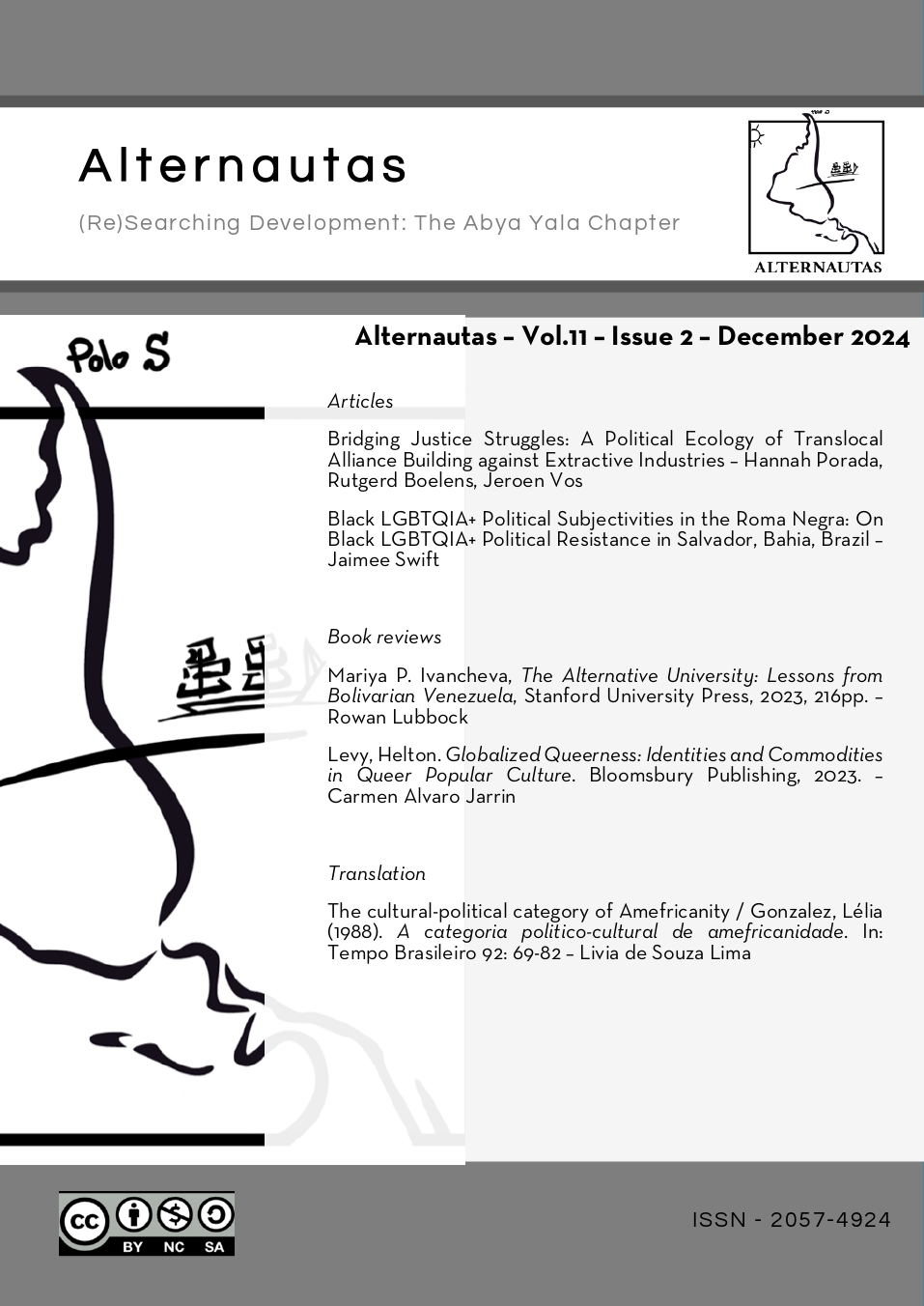Abstract
Among the pantheon of left-wing Latin American governments that swept the continent in the early 21st century, arguably the most radical, most beguiling, most contradictory, and most tragic, is the Bolivarian Revolution in Venezuela. Given its unique (though not necessarily ‘special’) place within this political conjuncture, no shortage of ink has been spilled on the deep-seated transformations carried out in the name of the Venezuelan people, as well as the domestic and international conflicts that followed in their wake (see, most recently, Marino 2018; Samet 2019; Cooper 2019; Wilde 2023; Lubbock 2024). Among the many themes examined by scholars, activists and other observers is the role of higher education reform within the Bolivarian Republic, and the ways in which Hugo Chávez Frias, the charismatic leader of the ‘Bolivarian turn’, sought to build a new society by cultivating new knowledge among the people.
References
Adas, Michael. 1989. Machines as the Measure of Men: Science, Technology, and Ideologies of Western Dominance. Ithaca: Cornell University Press.
Aporrea (2017), Dataanalysis: 85% de los venezolanos rechazan modificar la Constitución’, 10 June, https://www.aporrea.org/actualidad/n309811.html
Azzellini, Dario (2016), Communes and Workers’ Control in Venezuela: Building 21st Century Socialism from Below. Leiden: Brill.
Boothroyd, Rachael (2017), ‘Commune Activist Refused Permission by ANC to Stand as Mayor’, Venezuelanalysis November 30, https://venezuelanalysis.com/news/13524/
Branch, Jordan. 2013. The Cartographic State: Maps, Territory, and the Origins of Sovereignty. 1st ed. Cambridge University Press. doi:10.1017/CBO9781139644372
Cooper, Amy (2019), State of Health: Pleasure and Politics in Venezuelan Health Care Under Chávez, Oakland, Ca.: University of California Press.
Coronil, Fernando (1997), The Magical State. Nature, Money, and Modernity in Venezuela, Chicago: Chicago University Press.
Elfenbein, Rachel (2019), Engendering Revolution. Women, Unpaid Labor, and Materialism in Bolivarian Venezuela. Austin: University of Texas Press.
Ellner, Steve (2008), Rethinking Venezuelan Politics: Class, Conflict, and the Chávez Phenomenon, Boulder: Lynne Rienner.
Espina, Gioconda. and Rakowski, Cathy A. (2010), ‘Waking Women Up? Hugo Chávez, Populism, and Venezuela’s “Popular” Women’, in K. Kampwirth (ed.), Gender and Populism in Latin America: Passionate Politics, Pennsylvania: Penn State University Press, pp. 180-202.
Granados Ceja, José Luis (2023), ‘Communist Party of Venezuela Decries “Usurpation” by Supreme Court’, Venezuelanalysis, August 15, https://venezuelanalysis.com/news/communist-party-of-venezuela-decries-usurpation-by-supreme-court/
Harnecker, Marta (2005), Understanding the Venezuelan Revolution: Hugo Chávez Talks to Marta Harnecker, New York: Monthly Review.
Hurtado, Samuel (1998), Matrisocialidad. Caracas: EBUC-FACES
Kappeler, Aaron (2023) ‘Breeding sovereignty: the production of race, nature, and capital in Venezuela’, Journal of the Royal Anthropological Institute, 29(2), pp. 245-267.
Koerner, Lucas (2022), ‘In the Empire’s Crosshairs. Toward a World-Systemic History of Venezuela’s Campesino Movement’, in Steve Ellner, Ronaldo Munck and Kyla Sanky (eds), Latin American Social Movements and Progressive Governments: Creative Tensions between Resistance and Convergence, pp. 171-193, Lanham, M.D.: Rowman and Littlefield.
Krupa, Christopher and Nugent, David (2015), ‘Off-centred states: Rethinking State theory Through an Andean Lens’, in Christopher Krupa and David Nugent (eds), State Theory and Andean Politics, pp. 1-34, Philadelphia: University of Pennsylvania Press.
Larrabure, Manuel (2013), ‘Human Development and Class Struggle in Venezuela’s Popular Economy: The Paradox of “Twenty-First Century Socialism”’, Historical Materialism, 21(4): 177-2.
Lubbock, Rowan (2024), Cultivating Socialism: Venezuela, ALBA and the Politics of Food Sovereignty, Athens: University of Georgia Press.
Marino, Angela (2018), Populism and Performance in the Bolivarian Revolution of Venezuela. Evanston, Ill.: Northwestern University Press.
Page, Tiffany Linton (2010), ‘Can the State Create Campesinos? A Comparative Analysis of the Venezuelan and Cuban Repeasantization Programmes’, Journal of Agrarian Change 10(2), pp. 251-272.
Poulantzas, Nicos (2014 [1978]), State, Power, Socialism, London: Verso.
Samet, Robert (2019), Deadline: Populism and the Press in Venezuela, Chicago, London: University of Chicago Press.
Scott, James (1998) Seeing Like a State: How Certain Schemes to Improve the Human Condition Have Failed, New Haven, C.T.: Yale University Press.
Torres, Andreina I. (2022), ‘Building the Revolution: Ideology, Affect and Gender in Bolivarian Caracas’, PhD Thesis, The City University (New York).
Wilde, Matthew (2023), A Blessing and a Curse: Oil, Politics, and Morality in Bolivarian Venezuela, Stanford, Ca.: Stanford University Press.

This work is licensed under a Creative Commons Attribution-NonCommercial-ShareAlike 4.0 International License.
Copyright (c) 2024 Rowan Lubbock


